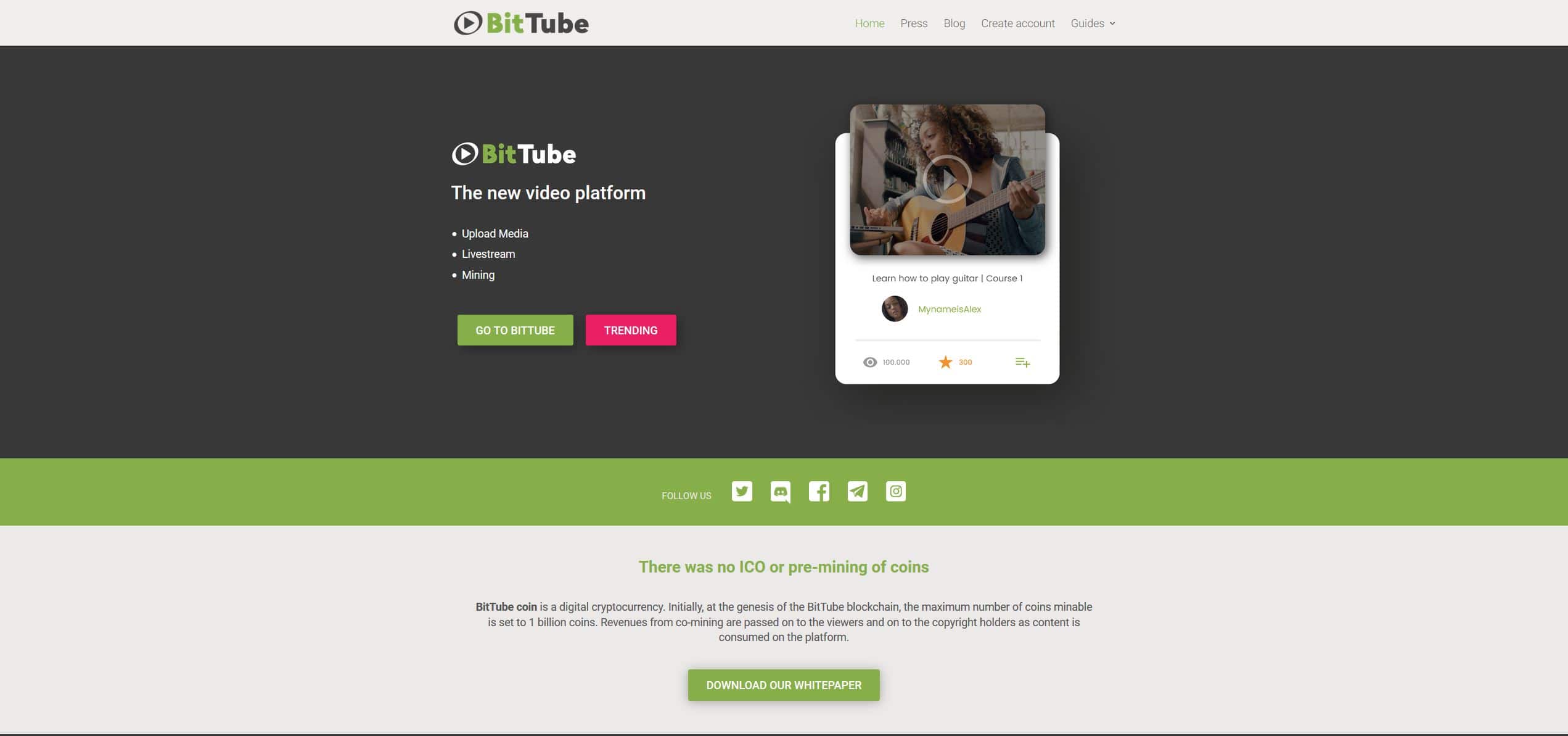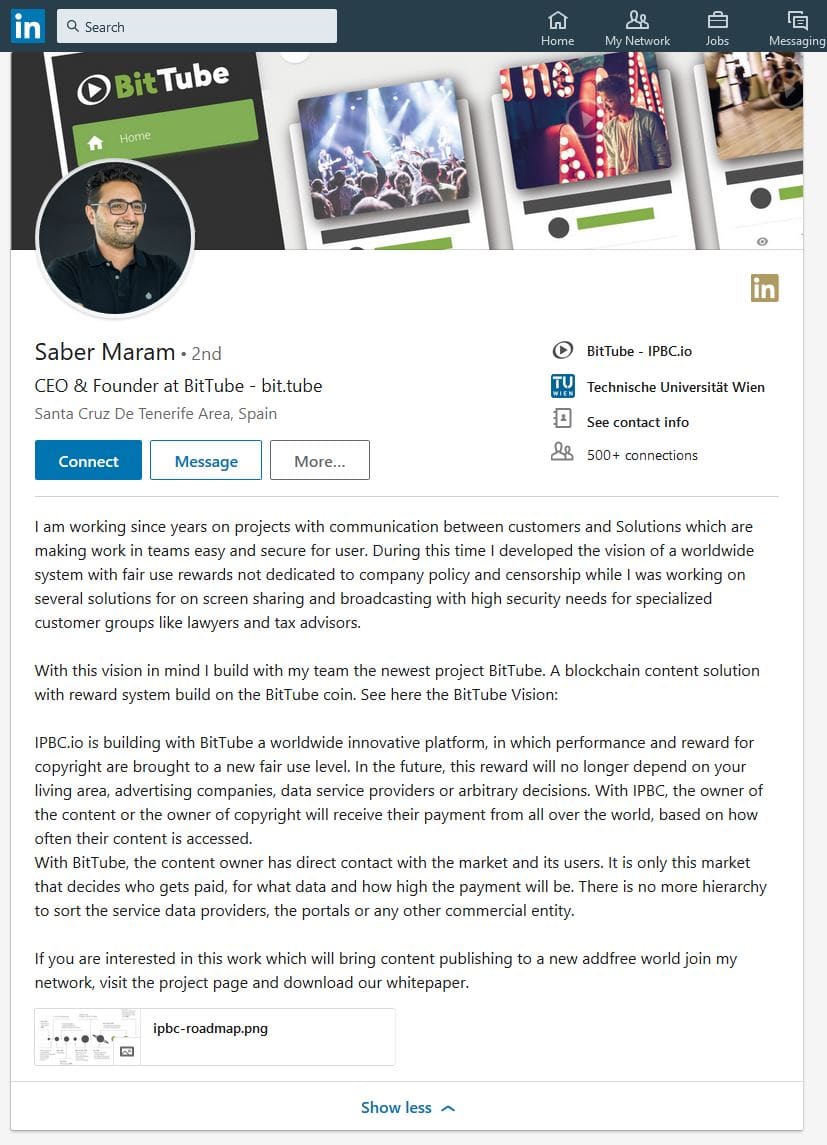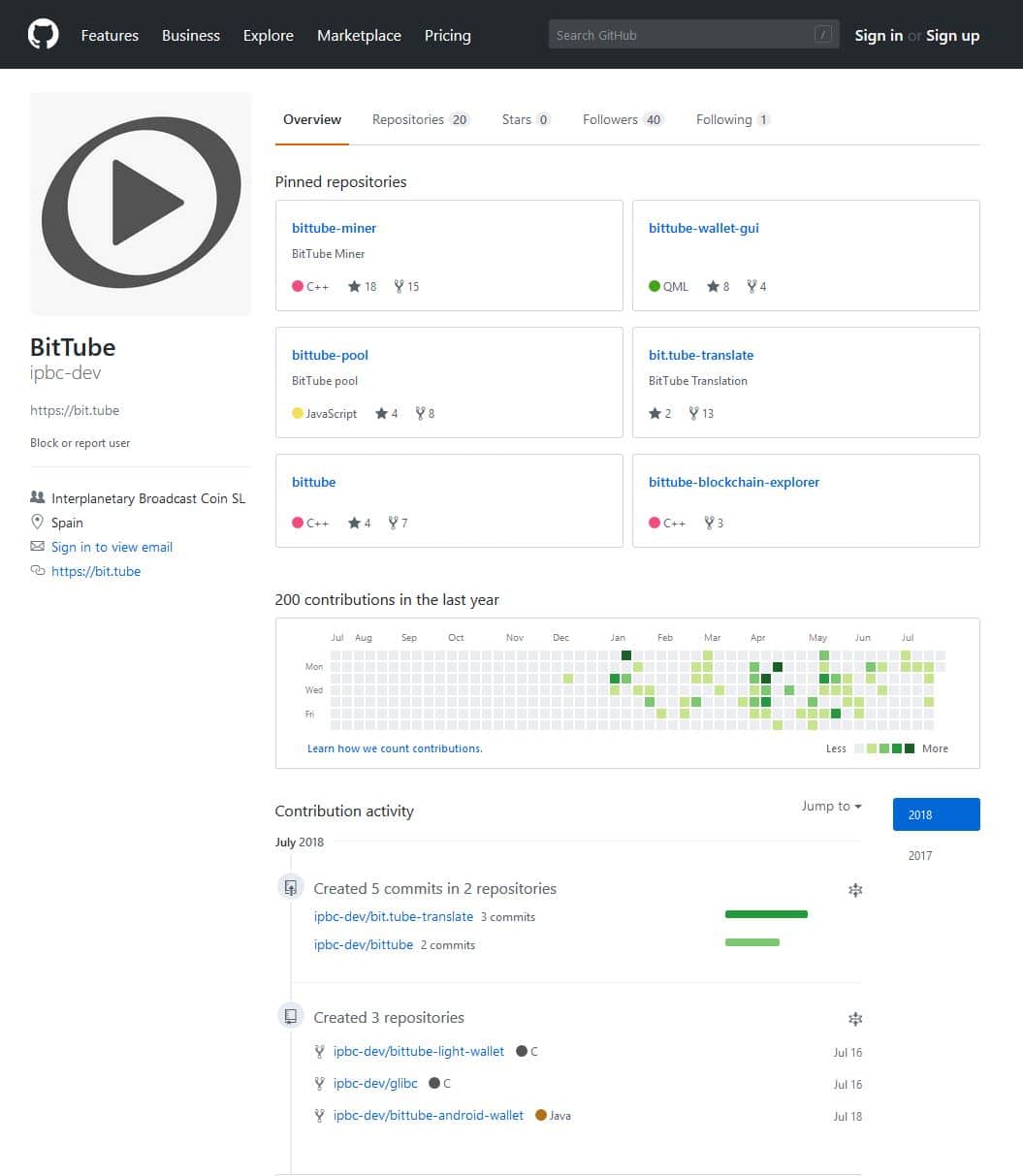BitTube, like a number of blockchain projects, aspires to become the “Bitcoin YouTube”, or what you might call the decentralized, cryptocurrency powered YouTube alternative. Founded by Halsey Minor, the VideoCoin project contends for a spot on the playing field. And others like Livepeer and YouNow provide similar YouTube alternatives.
But now BitTube hopes to earn its place as the Bitcoin YouTube.

BitTube provides a system to enable video content producers to publish work free from censorship. The platform also eliminates the need for centralized storage companies. And significantly, the system eliminates the dependence on selling advertising to earn revenue. Content owners receive payment from viewers, and these transactions occur by way of the system’s cryptocurrency, known as BitTube Coin (TUBE).
How Does BitTube Work?
The company’s white paper documents its technology and goals.
Decentralized Platform
And among these goals, decentralization provides the primary benefit to distinguish BitTube as the Bitcoin YouTube. A major component of this is that all online storage happens on the Interplanetary File System (IPFS). IPFS seeks to decentralize the web through a peer-to-peer hypermedia protocol that replaces HTML. This takes control of user data out of the hands of centralized storage companies, and it returns that control to the users.
Consequently, data resides not at a physically fixed address but is transferred to a global server network. And hashing (unique mathematical identifiers) safeguards the integrity of the data. Then the algorithm enhances efficiency by avoiding duplicate data to be managed and reducing data transfer. And the network always searches for the nearest and fastest data source.

Browser Application
And as a YouTube alternative, BitTube lives entirely in the browser. So users who simply want to watch videos don’t need to install any special software to view BitTube content. And beyond data uploaded through BitTube, any video on the network properly identified by a hash may also be viewed.
Users who want to broadcast live video do need to install the BitTube Sender software. This software enables users to share their screen. The software uploads data to the BitTube network and delivers a broadcast directly through the peer-to-peer (P2P) network without a centralized data center.
Content Viewers Get Paid As Well
The financial model works by having users mine TUBE while viewing videos. Then the generated coins get divided between the content provider, BitTube, and the user.
The content owner earns revenue from the very first viewer, and BitTube doesn’t require a high number of followers to earn rewards. As viewers mine TUBE while watching videos, viewers also receive payment. Users from low-income areas thus form a target demographic of viewers because simply viewing content provides potential income for them.
According to the white paper, BitTube itself receives about 10% of all media revenue as income.
Blockchain Explorer and Anonymity
BitTube provides a blockchain explorer to show all transactions, and it thereby provides transparency. The explorer reports the distribution of all rewards allocated, and it shows which content and viewers provided how much income.
As can be expected with decentralized blockchain technology, BitTube doesn’t collect and store any personally identifying information but uses cryptographic information, thus protecting user anonymity.
More About BitTube

Saber Maram founded BitTube in December of 2017 and serves as CEO. BitTube is headquartered in the Santa Cruz De Tenerife area of Spain. After four years of being an IT supervisor at OBI Group Holding for European DIY retail, Saber Maram became an entrepreneur. And after 15 years of leading and founding several companies, he began BitTube.
As for the size of the team, 22 people claim association with the company on LinkedIn, some as consultants and advisors, and some as office support, as well as technical staff. The company has 84 followers on LinkedIn. Kai-Uwe Schnier has served as CFO since company inception.
On social media, BitTube shows 2,657 members on Discord and 7,103 members on Telegram. BitTube’s Twitter account shows 7,090 followers.
TUBE Supply and Sustainability
As for the technology, engineers programmed BitTube source code in the C++ programming language, and the Monero code base served as the starting point for this project. Monero uses the CryptoNight proof-of-work consensus algorithm, and this, in turn, comes from the CryptoNote protocol.

Privacy reigns preeminent in this approach. And in a mass surveillance world, CryptoNote strives to ensure true privacy through cryptography and egalitarianism. Also as an implementation of CryptoNote, CryptoNight targets its design to be suitable for ordinary PC CPUs to mine. And no special purpose hardware devices to enhance mining efficiency exist, so miners cannot unfairly advantage themselves by purchasing additional hardware.
This all makes the TUBE algorithm resistant to ASIC and Nicehash, and CPU mining provides a natural habitat for the BitTube ecosystem.
No ICO launched to generate income for the company, and no pre-mining of coins occurred. BitTube caps the maximum number of TUBE minable at 1 billion coins. And users mine coins simply by viewing videos.
As a “Bitcoin YouTube” and not a centralized online service, BitTube intends to establish an appropriate voting system within the platform to enable community participation. And Baseline Improvement Proposals (BIPs) will be used to determine possible fork paths of the coin, as well as decisions concerning the coin reserve.
TUBE Trading History
BitCoin Coin (TUBE) currently holds a market cap of $5,567,584, and as of this writing the coin sells at slightly below $0.08. And TUBE began at initial release at a value of $.10 per coin, so the value has declined slightly. But the company started only in December of 2017, so this represents only half a year of operation.

Wallet Investor considers the coin to be a bad long-term investment, and says, “According to our Forecast System, TUBE is a bad long-term (1-year) investment…It’s important to note that due to the low market cap, TUBE price can be easily manipulated.”
To be fair, TUBE represents a utility token, and not a security like company stock. So TUBE provides a way for users to pay for viewing content, and compensation for content providers, and for the company to generate revenue. But TUBE doesn’t pretend to represent ownership in the company and provide wealth to investors in that way.
Where Can You Buy TUBE?
Several exchanges trade in TUBE. And as a “Bitcoin YouTube”, you trade Bitcoin for TUBE.
Livecoin and TradeOgre allow you to purchase TUBE. Livecoin added TUBE as of February 21, 2018.
TUBE trades on Upbit, and Upbit comprises a Korean cryptocurrency-to-cryptocurrency (C2C) exchange. Upbit launched from the biggest messaging app developer in Korea, Kakao, which in turn teamed up with Bittrex. So to trade on Upbit, you need to register an account on Kakao.
Where Can You Store TUBE?
As a Bitcoin YouTube alternative, BitTube provides its own full-featured wallet, allowing a seamless user experience. Consequently, publishers of content manage their wallet addresses and transfer of assets. The wallet maintains an association between the wallet and the content. And the wallet also functions as a stand-alone miner for the BitTube pool.






